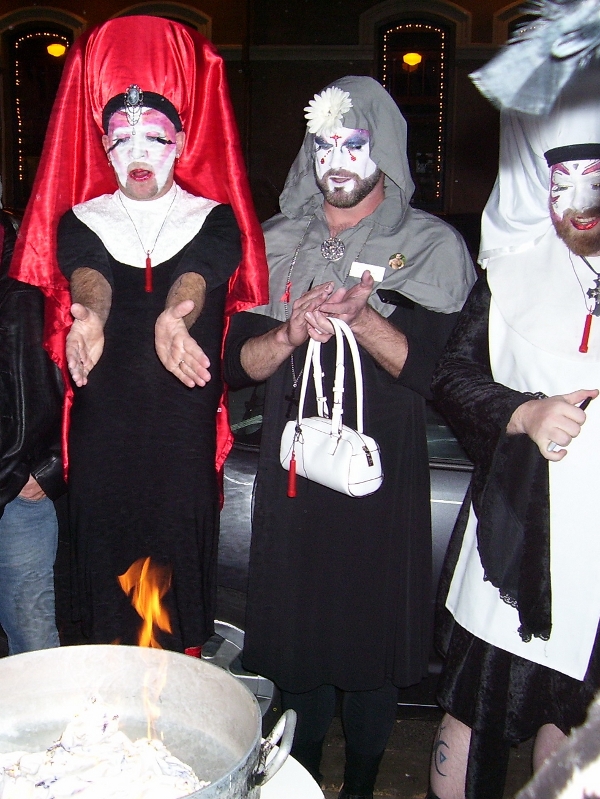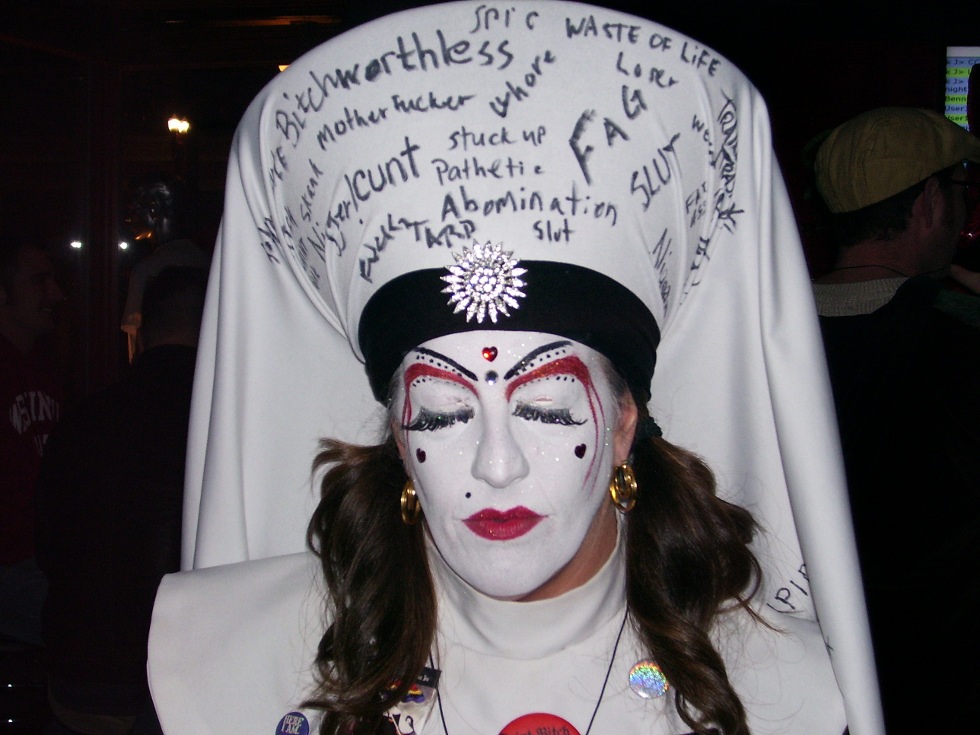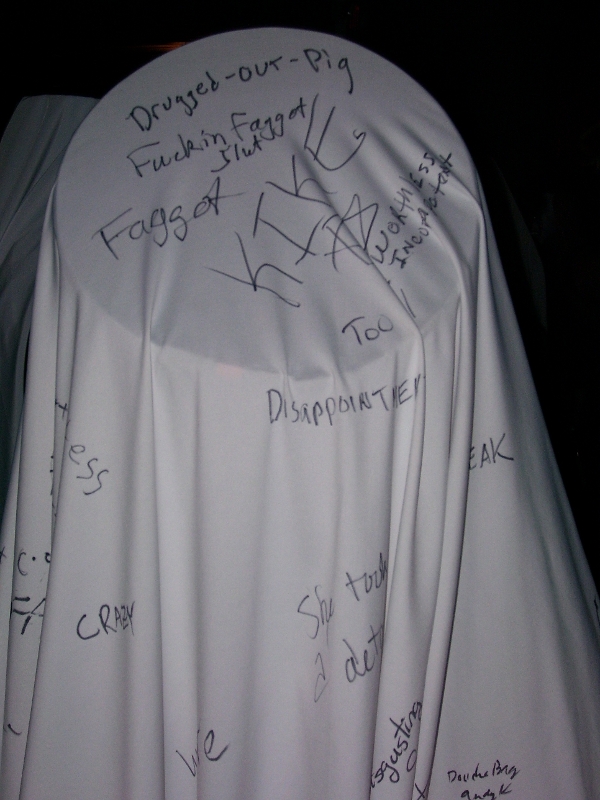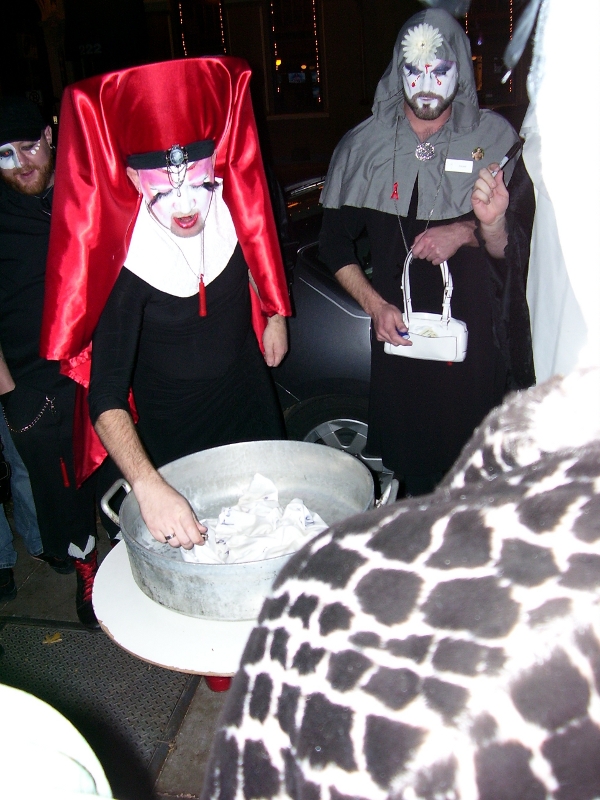Sisters of Perpetual Indulgence
by Melissa Wilcox
Spirituality appears in the queerest of places. Since the fall of 2009 I have been spending time with the Sisters of Perpetual Indulgence. For more than thirty years the members of this international, religiously unaffiliated organization have been serving as nuns to their communities: originally mostly gay men but increasingly also including bisexuals of all genders, lesbians, transgender people, and queer folk. In their capacity as (in their words) “twenty-first century nuns,” the Sisters fundraise, educate, advocate for, support, and care for their constituents. All this they do with a sex-positive twist, however; the Sisters, in fact, were among the first to produce sex-positive safer-sex materials after the identification of AIDS among gay male populations, and they continue to concern themselves with both the fun and the health and safety of sex.
Though AIDS is not the Sisters’ sole concern—they fundraise and advocate for causes ranging from sex workers’ rights to gay retirement homes–it is one of their earliest and most central areas of advocacy. As a result, they often take part in events such as AIDS walks and rides, and they are generally out in force on World AIDS Day. On December 1, 2009, I joined members of the Order of Benevolent Bliss in Portland, Oregon for a “walking vigil”: an event that was part bar crawl, part awareness-raising, part ritual, and part, well, pure Sisters.
It was a slow Tuesday night when we arrived at the first bar; the eleven members of the order who were present, along with myself and a handful of friends, dominated the room. The Sisters were decked out in their customary habits: bowl-shaped coronets and colorful veils above whiteface and glam makeup, fancy dresses, and footwear ranging from sneakers to platform boots. Ruth Les’Bitch wore the gray hood and white lips of a postulant, and Novice Guard Justice Once was accompanying the Sisters in order to assist and support them. Several Sisters wore the white veils and formal habits of a novice. But tonight it was not only the novice Sisters who wore white. Two of the fully professed Sisters, usually found in black or colored veils, wore white veils as well. Sister Krissy Fiction explained to me that she was wearing the “Veil of Remembrance”; Sister Maya Poonani was wearing the “Veil of Shame.”
For several years, the Order of Benevolent Bliss has conducted a walking vigil on World AIDS Day, and each year two of the fully professed Sisters, or FP’s, have worn these white veils. Carrying a black permanent marker, the Sister wearing each veil approaches people during the vigil and invites them to write on her veil. On the Veil of Remembrance go the names of those who have died of AIDS whom the bar patrons wish to remember; the Veil of Shame bears epithets they wish to forget.
As we walked from bar to bar—five in all this evening—I watched the Sisters interact with those around them. They talked about World AIDS Day and about the two veils, greeted people in the bars and on the street, even sang a little karaoke in one establishment. They were greeted with a mix of delight and confusion, depending on their familiarity to the bar and its individual patrons. At one point, Sister Ohna Fuckin’ Tirade pulled me aside to tell me that she had been approached by a woman curious about who the Sisters were and what they were doing that evening. Upon learning of their vigil, she confided to Sister Ohna that her father had died of AIDS years before, but no one in the family knew except herself and her mother. Sister Ohna was clearly moved by this incident, and told me that it is not unusual for strangers to spontaneously share intimate stories with the Sisters. Repeatedly, Sisters have told me that members of their communities will confide to a Sister what they would never confide to her “secular [often male-identified] self.” Though they use the term “secular” to refer to their lives outside of the Order, the Sisters are being simultaneously parodic and serious when they make such categorical distinctions.
Over the course of the evening, Sister Maya’s veil became covered with familiar epithets for gay, lesbian, bisexual, and transgender people as well as for Jews and people of color, while on Sister Krissy’s veil the names of the dead multiplied. Ultimately, the fate of the Veil of Remembrance was to be preserved in the order’s archives; the Veil of Shame, however, was the focus of a ritual that ended the evening.
We had arrived at C.C. Slaughter’s, a popular bar populated largely by gay men. Though it was relatively empty on a Tuesday, the Sisters still found plenty of people to talk with. After some time, Sister Maya disappeared, returning with the Veil of Shame in her hands and a clean veil on her head. The Sisters and a handful of others went outside, where a bartender had brought a metal tub and an open bottle of beer. One Sister placed the veil in the tub, and the bartender poured the beer over it. Sister Krissy Fiction, an ordained UCC minister in her life beyond the Sisters, led the gathered crowd in a chant to banish the epithets on the veil, and after some searching for a small lighter, Sister Polly Amorous set the cloth aflame.
A number of the Portland Sisters, and Sisters in other cities as well, have told me that the work they do in whiteface is an important part—and sometimes the central part—of what they call their spiritual lives. Like many people in the U.S., the Sisters describe their spirituality as an individual connection to the sacred that can be, but is not necessarily, connected to the beliefs and practices of organized religious groups. Some Sisters have what they term a “spirituality” beyond the Sisters themselves, characterized by everything from Christianity to an eclectic mix of practices to agnostic beliefs with no particular form of practice. Other Sisters describe their involvement with the movement itself as their form of spirituality or even of religion.

World AIDS Day is a particularly evident example of the very queer spirituality that is present in the Sisters. Elsewhere that evening, and earlier, the Sisters had offered a blessing to open a more traditional AIDS vigil at Portland’s mostly-LGBT Metropolitan Community Church. But for the Order of Benevolent Bliss–characterized by one member in an interview with me as the least spiritual order of Sisters in existence–offering blessings and gathering in a church are unusual activities. Raising awareness, however, honoring people’s grief, and serving their communities, are weekly and sometimes daily occurrences for these “queer nuns.” The ritual may not invoke deities, the organization may not be officially religious, and the order may be “the least spiritual” of them all, but among the Sisters spirituality is often everywhere.



